Here’s a funny thing about “action reads:” a lot of people would equate that to mean a whole lot of running and chasing and swordplay. They wouldn’t be wrong, of course, but all the physical action in the world can’t liven up a bland tale, or make boring characters interesting, and there’s actually plenty of forward momentum and tension to be had in some fantasy adventure stories without the more obvious blood-letting. And then of course there’s lyrical prose. Me, I prefer to see my action with great characters and some lovely writing, and today I’m going to share a few favorites that deliver all those things.
Last Song Before Night by Ilana C. Myer
There’s a reason NPR described Ilana C. Myer’s first novel as “lyrical, dynamic, and winningly melodic.” That’s a wonderful summation of some of the book’s strengths, and can serve equally well as a descriptor for Myer’s writing throughout the trilogy.
I really can’t understand why her wonderful prose hasn’t earned this gifted author a wider audience. Maybe it’s because people think “lyrical” means slow. Yes, the descriptions are gorgeous, but don’t wander in expecting languid limpid pools to be the subject page after page. Here, have a glimpse from deep in the book and see what she does with the simple act of a musician playing before a fireside audience.
“His hands stroked the strings almost tenderly, to start, but that of course did not last. As with so many things, tenderness was only a beginning, giving way to need and violence. And on the first chord where tenderness gave way to need, Edrien’s voice joined the music of the strings, lifted in a chant that recalled the earliest songs fo the people who had wandered these mountains, the songs they had bequeathed, over centuries, to their children. That much, at least, he owed his hosts. But it was a song he had written himself, combining their traditional forms with his own inspiration as a young man. It was one of the songs that had made his name what it was.
The children were talking and laughing at first, but soon Edrien was aware that in addition to the darkness that encircled them, they were ensconced in breathless silence that only his music filled.”
The flawed and driven characters and the mysteries they uncover propel this book so that you’re soon turning the pages with anticipation. Myers supplies plenty of dynamic tension and layered backstories. When violence occurs in a Myers scene, it is sharp and deadly. I love that much of the book (and those that follow) are set in a musical college that actually feels like a real institution where fantasy bards would train, one with fascinating traditions and secrets so engaging I really wish I’d thought of them myself. And best of all, each book is a little bit better than the one that precedes it, and they start out strong indeed.
Buy the Book
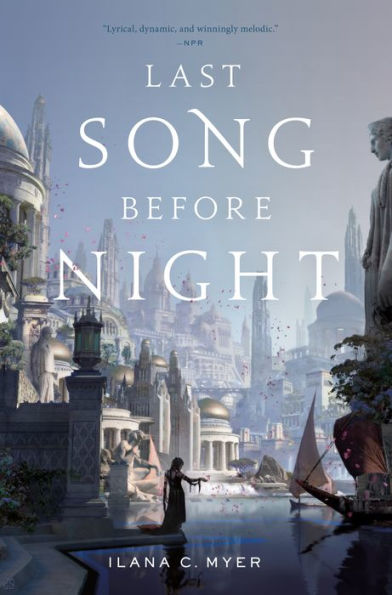

Last Song Before Night
Sea-Kings of Mars and Otherworldly Stories by Leigh Brackett
From a recent author, let me shift to one well-regarded but too-often neglected, the late, great, Leigh Brackett. I’ve talked about her everywhere until I’m blue in the face, and you can find write-ups about her across the interweb. So instead of talking about her or summarizing her, just savor this:
“He came alone into the wineshop, wrapped in a dark red cloak, with the cowl drawn over his head. He stood for a moment by the doorway and one of the slim dark predatory women who live in those places went to him, with a silvery chiming from the little bells that were almost all she wore.
I saw her smile up at him. And then, suddenly, the smile became fixed and something happened to her eyes. She was no longer looking at the cloaked man but through him. In the oddest fashion — it was as though he had become invisible.
She went by him. Whether she passed some word along or not I couldn’t tell but an empty space widened around the stranger. And no one looked at him. They did not avoid looking at him. They simply refused to see him.”
Those are the opening words to one of Brackett’s final stories set on her faded, dying Mars, “The Last Days of Shandakor.” She always wrote like that, no matter if she was writing hardboiled mysteries or hardboiled space opera, or hardboiled planetary adventure. Note the key term there, hardboiled, because there’s always a sense of loss in her fiction, and her heroes are haunted and a little broken by life’s trials. If you’ve always wished someone had been writing noir adventure science fiction, well, someone was, and she wrote a lot of it. And she never failed to deliver the action beats and propulsive pacing.
Buy the Book
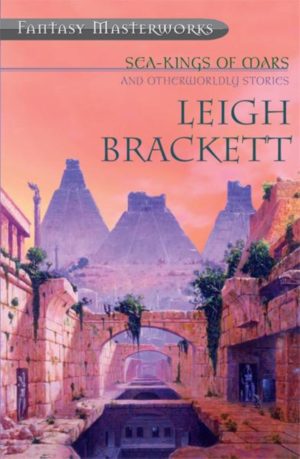

Sea Kings of Mars and Otherworldly Stories
The Coming of Conan by Robert E. Howard
Let’s turn next to someone who should need no introduction: Robert E. Howard. The thing is, he probably DOES need an introduction, because the concept of Conan looms so large over his writing that it can be hard to separate what we think we know of the character and the writing itself from what’s actually there. For those who have never read his work I always have to begin by pointing out that they were written in the 1930s by a man who died when he was 30. And then I have to point out that Conan himself is a more complex character than popularly depicted. Finally, there’s a great deal of power in Howard’s prose, and anyone only familiar with the cinematic Conan is really missing something. Read this, from “Queen of the Black Coast,” where Conan, Bêlit, and their pirate crew row up a river in the darkness:
“Rising above the black denseness of the trees and above the waving fronds, the moon silvered the river, and their wake became a rippling scintillation of phosphorescent bubbles that widened like a shining road of bursting jewels. The oars dipped into the shining water and came up sheathed in frosty silver. The plumes on the warriors’ head-pieces nodded in the wind, and the gems on sword-hilts and harness sparkled frostily.”
His prose is rich with evocative writing just like this, and he has many characters and settings beyond Conan that deserve a look.
Buy the Book
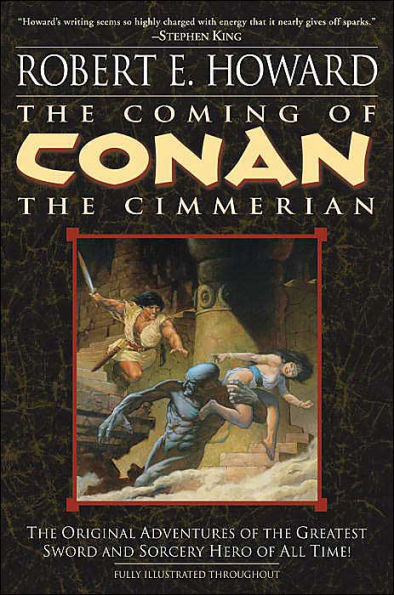

The Coming of Conan the Cimmerian
Imaro by Charles Saunders
From Howard’s Hyboria let us shift our gaze to Nyumbani, the African-like fantasy realm where Charles Saunders’ mighty Imaro strides forth into adventure. Debuting around the same time as Michael Moorcock’s and Karl Edward Wagner’s heroic fiction, Imaro is at least as compelling than better known characters and it’s always mystified me that the brave wanderer isn’t discussed more regularly. Not only are Imaro’s exploits great fun, they’re stuffed full of grand writing and memorable characters.
In this scene, Imaro has been embraced by a band of people, the Mtumwe, after rescuing a man attacked by a crocodile. They have challenged him to join their dance one evening:
“The crowd of dancers gave ground as he approached, making way for their guest from afar. And the drumming subsided to a low background mutter as Imaro stood alone in the firelit dance space.
For a long moment, the warrior remained motionless, as though gathering energy into himself. Then, without warning, he sprang so high into the air it seemed he had disappeared. Even the drumming halted as the astonished Mtumwe waited for Imaro to return to the ground. And they wondered how he would manage to land without injuring himself.
When Imaro descended, however, his feet touched the earth as lightly as those of one of the small forest cats that lived in the shadow of Chui the leopard. Now he crouched in a fighting stance: one arm extended as though he were wielding an arem; the closer to his body, in the position of a shield.”
Imaro wanders a fantastical Africa based partly on myth and partly conjured from Saunders’ gifted imagination, righting wrongs, seeking acceptance, and searching for a home. He may be the single most likeable of all heroic fiction protagonists. Elric or Kane might fascinate, but you really find yourself rooting for Imaro – you wouldn’t mind hosting a feast for him to give the guy a break, and no one without a death wish would want to sit down with most sword-and-sorcery characters. It’s about time Imaro got a movie so Saunders and his creations could receive the attention and acclaim they’re due. Interested parties should start with the first volume, Imaro, and be prepared for wonders.
Buy the Book
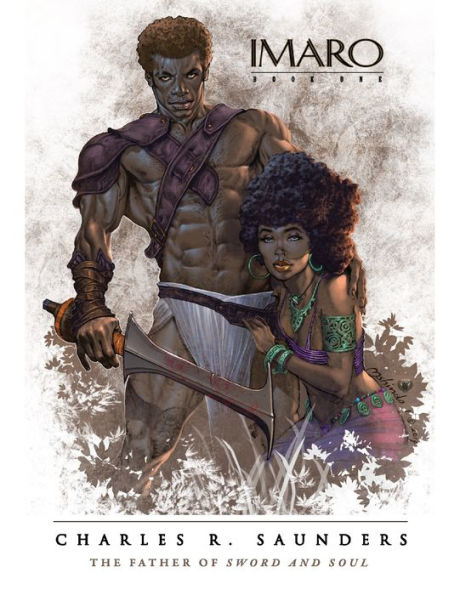

Imaro
Bard by Keith Taylor
As long as we’re discussing neglected fantasy characters from the ‘70s and ‘80s, let’s close up with Keith Taylor’s Bard books. There were five in all, although the fifth seems to have a smaller print run, for it can be hard to come by. The titular Bard, Felimid Mac Fal, descendant of Druids and the Tuatha de Danann, wanders the Celtic world, which is our own historical world mixed with fantasy elements. The writing is sharp and lyrical – there’s that dangerous word that does NOT translate as slow — and the action is vivid. In book one alone there’s one of the best battles with a giant spider ever put to page, superior to Tolkien and rivaled only by Robert E. Howard’s “The Tower of the Elephant.”) And that’s not even the book’s finest moment. Adventure aplenty awaits all those who dare Taylor’s pages, as well as a sense of playfulness that’s almost mythic and often hard to come by in a lot of more recent fantasy. Here, from early on in the first book, is a moment when Felimid first plays his fabulous harp before a king who plots against him:
“Her black oak frame sheened like silk from generations of loving use. Within its curve, subtle, cardioid, were stretched golden strings like lines of light, slanting through fine holes. Felimid’s long-fingered hand moved across them, setting free a surge of enchanted sound. It summoned the powers of growth and increase. The noises and scents of spring came into Oisc’s hall. Dogs sniffed the air in bewilderment.”
What Felimid’s audience doesn’t know is that he’s working a cantrip on their king, to make his bear grow:
“Felimid’s victim looked baffled, as nearly as could be told from his bearded and hideous face. Then, as something crawled hairily over his hands where one held a drinking horn and the other drummed irritable fingers on the table before him, he was moved to look down. His yell of astonishment drew every eye in the hall.
His beard had spread across his chest like a great flowing glacier and was now twisting, curling, writhing over the table, growing at a rate of yards each minute.”
Buy the Book
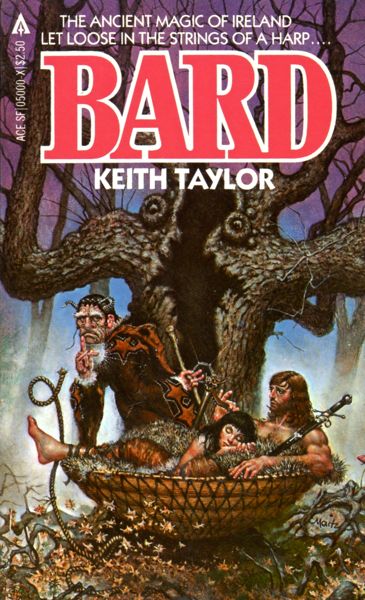

Bard
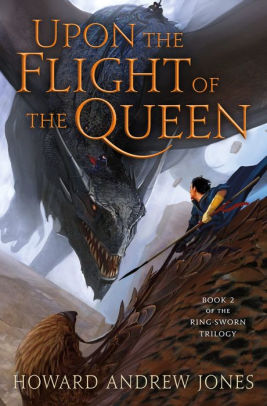 When not helping run his small family farm or spending time with his amazing wife and children, Howard Andrew Jones is hunched over his laptop or notebook mumbling about flashing swords and doom-haunted towers. He has worked as a TV cameraman, a book editor, a recycling consultant, and a college writing instructor. He edited 8 collections of Harold Lamb’s historicals and served as Managing Editor of Black Gate. He edits the sword-and-sorcery magazine Tales From the Magician’s Skull and edits fiction for the Perilous Worlds book imprint. Check out the book trailer to Jones’ upcoming novel, Upon the Flight of the Queen—available November 19th from St. Martin’s Press.
When not helping run his small family farm or spending time with his amazing wife and children, Howard Andrew Jones is hunched over his laptop or notebook mumbling about flashing swords and doom-haunted towers. He has worked as a TV cameraman, a book editor, a recycling consultant, and a college writing instructor. He edited 8 collections of Harold Lamb’s historicals and served as Managing Editor of Black Gate. He edits the sword-and-sorcery magazine Tales From the Magician’s Skull and edits fiction for the Perilous Worlds book imprint. Check out the book trailer to Jones’ upcoming novel, Upon the Flight of the Queen—available November 19th from St. Martin’s Press.











For lyrical prose, I always default to Jacqueline Carey’s, “Kushiel’s Legacy”. The first trilogy especially. Come for the prose, stay for the court intrigue, sword fights, desperate escapes and sex.
Thanks for the suggestions. My TBR pile grows…
How did I miss the sequel/next book to Last Song Before Night? I suspect Tor.com did not make the connection explicit enough in their reviews. Or I hadn’t read LSBN before Fire Dance came out but I prefer to blame a website.
I’ve never known anyone else who read the Bard series. Those books defined my tween years (and honestly, I probably shouldn’t have been allowed to read them at that age). I still have my original copies from the 80s, torn and dog-eared. I’d love to see ebook versions of them, as my original copies are starting to get pretty fragile.
Refreshing to see two of my favorites in here. It justifies the appeal It had to me at a young age. RE Howard is legendary and the Bard books, of which i own 4, are exceptional
That cover of Last Song Before Night looks a lot like the cover for Daniel Abraham’s A Shadow in Summer. Same artist?
a-shadow-in-summer
@3.. I’ve read 4 of Keith Taylor’s Bard. Loved, loved them!!! Never found the 5th. Sadly they got lost in a move & I’m trying to find them. Hope can find the set!
As for a lyrical author, one of my favorites will have to be Janny Wurts. Some people I’ve given her books to read say she is too wordy. But her descriptions are almost movie-like. At least for me.
@6 – Janny Wurts is the worst (pun intended). Trying to read her Shadow & Light series gave me a headache. I don’t want to have to decipher every freaking sentence to get its meaning.
@7. Everyone has a favorite that others don’t like. To each their own
1. I was never sure that Kushiel would be my cup of tea. Perhaps, though, I should at least give it a shot
2. And book 3 is coming next year. I was fortunate enough to read it in manuscript … and if anything it’s even better than the first two
3., 4.They are grand stuff. It took me years to find a reasonably priced copy of the fifth one. Before I finally read it I’m going to read-read the first four. It has been a long time..
5. Sunspear, I have no idea. I’ll a see if Ilana herself knows
6., 7. Now you’ve given me another author for my TBR pile!
How does Wurts compare to these other lyrical action writers?
@13. Some people say she’s very wordy. Idk if I can post this here, if not acceptable, I’ll delete it. This is first chapter of her Wars of Light & Shadow – Curse of the Mistwraith
The series is 10 books long so far with the last book supposedly coming out next year.
14. Mouse45, thanks, that’s a good choice for an excerpt. Certainly doesn’t seem wordy at all.
My go-to writers for lyricism are McKillip and Neumeier, although Wurts isn’t bad. She can do more in shorter space than just about anyone. Guy Kay is pretty good, too.
I sampled the Myer, and didn’t go further – let’s just say it wasn’t working for me. Maybe I’m not alone and that’s why she doesn’t get noticed. It kept reminding me of Kay’s Arbonne book, actually, and to the detriment of her work.
The sample from Howard is very good, except any story just seems to have stopped. Bracket’s sample is better – lyrical and things keep moving. Bard’s sample is odd – it reads very lyrical, and then starts going thud, thud, thud.
Here’s a sample of Neuemeier, from Door into Light, randomly opened to Ch 3’s opening
Then the rain began to turn aside. It wasn’t Taudde’s doing. It was someone else. The strong, warm voice of a reed-throated wooden flute, its tones almost familiar, turned the rain and gentled and softened the air, and a sharp darting of silver-edged notes, precisely timed and harmonious, sent lightning striking above and below but never close to the road.Another bardic sorcerer had come.
And here’s some McKillip, from Song for the Basilisk from where I last was reading it:
Where are we?
We are nowhere, he answered. We are sound. We are within the pipes.
He fashioned a path for them across the plain. Somewhere the earth was hard as stone, somewhere it rained; on this plain only stars fell, burning white, into the small red flame, into Hollis’s unblinking eyes. The horned moon rose before they crossed the plain; it caught a tear of fire from the candle as it passed, let it streak, a burning star, across the plain, through Hollis’s eyes. He blinked. Wind, like a long, exhaled breath, rolled across the plain. Caladrius smelled the sea.
.5 The artist is Stephen Martiniere, Sunspear
16. Elaine, thanks for the great samples.
The Howard excerpt comes at a spot in the story when breath is being gathered right before the main event, so to speak. And as for Bard, perhaps I should have been clear I was trying to show a passage that led us both into some lyricism and a confrontation that felt like something you’d find in myth, a quality I don’t see very often.
I haven’t read Arbonne, but I do like Kay, as well as Myer. Much of success in publishing in this day and age comes down to just how hard the publisher is pushing your work to break through the white noise, though there is always luck, and lucky timing. I see far too many wonderful works going unrecognized.
I’d throw in a mention of C.J. Cherryh, at least when she’s in more of a fantasy mode — the Morgaine books in particular.
Also Tanith Lee, as in Anackire:
19. Hoopmanjh, I dig the writing of Tanith Lee, although more on a line by line basis than a story basis. Frequently her plotting doesn’t work for me.
I bounced off one Cherryh book when I was very young, probably too young to be trying it. I really ought to attempt her again. You have a suggestion or two?
@9 Kushiel seriously isn’t for everyone. The sex can be described with as much detail as anything else, when it serves the story (it’s my favourite thing, if the sex doesn’t serve some other purpose, plot, character development, etc, it is glossed over). And the fact that our heroine is a god- touched holy prostitute who achieves her greatest pleasures through pain can turn some people off too.
But the world, plot, characters, action… it’s all so lush and rich and I loved every word of all 9 volumes.
For Cherryh, I’m thinking the Morgaine books (beginning with Gate of Ivrel, from which I took the passage quoted above) might be a good place to start; or her standalone novel The Paladin.
For something more SF (as opposed to fantasy), The Pride of Chanur or Merchanter’s Luck.
She does have a very distinctive style, especially in her SF, that can take a bit of getting used to.
21. Yes, that doesn’t sound like it’s my kind of thing…
22. Thanks for the specific recommendations!
Mary Gentle
Roger Zelazny, of course, in his more poetical moods, wrote lyrical, and sometimes straight up poetic, prose. Bits from “This Immortal”/”And Call Me Conrad” come to mind at the moment, where he plays for the satyr and the prose conveys Conrad’s emotions, but this touch is in many of his books.
Louise Lawrence’s book “The Earth Witch” has that lyrical touch, with occasional odd phrasings meant to convey the Welsh way of speaking, and evoking the land itself like a summoning.
Neil Gaiman uses a lyrical manner in “Stardust” because that’s the way the story needed to be told. This is a tale of Faerie and ordinary plain English just wasn’t going to do.
In all cases, I think the thing about lyrical prose is that you can’t just rush through it in a mad dash. It forces you to slow down, to smell the flowers, to listen to the pan pipes, to watch the soaring of a crow over the Welsh hillsides, to wonder if that dormouse might be an enchanted prince seeking the nut of wisdom … or just a dormouse.
26. I’m a big Zelazny fan. In other articles on TOR you can’t get me to shut up about him…
Gaiman is a fantastic storyteller and likewise capable of great lyricism.
Alas, I don’t know the work of Lawrence! Another one for my TBR pile.
Here is a slice of Manly Wade Wellman’s Call Me From the Valley. Simple, lyrical, evocative.
Must have been a bend to that trail, because I came all at once in view of the light in the cabin’s glass window, before I notioned there was any living place around. The light looked warm yellow through the rain, and I hastened my wet feet. Close enough in, I could judge it was an old-made log house, the corners notch-locked and the logs clay-chinked, and the wide eaves with thick-split shakes on them, but I couldn’t really see. “Hello, the house!” I yelled out.
No sound back. Maybe the rain was keeping them from hearing me. I felt my way to the flat door-stone and knocked. No stir inside.
Groping for a knob, I found none, only a leather latch string, old style. And, old style, it was out. In my grandsire’s day, a latch string out meant come in. I pulled, and a wooden latch lifted inside and the door swung in before me.
The room was lit from a fireplace full of red coals, and from a candle stuck on a dish on a table middleway of the puncheon floor. That table took my eye as I stepped in. A cloth on it, and a plate of old white china with knife and fork at the sides, and a cup and saucer, yes and a folded napkin. But no food on the table, no coffee in the cup. A chair was set to the plate, and behind the chair, her hands crossed on its back, stood a woman, young and tall and proud-standing.
M A L A Z A N !
Erikson’s language is mostly sparse, but this makes it all the more impactful when he is descriptive. Maybe instead of this exact category, he fits more into ‘action’ and ‘lyrical prose’ smashed together in a chaotic manner.
Also second Kushiel’s dart though I have only read the first book.
Lyrical prose* is almost required for me to really love a story, though it’s not always sufficient to make me love the story if the plot and/or characters are too boring and/or bigoted. I’ve never been much interested in Conan stories, but that excerpt is enough to make me consider investigating them. I would try out the Bard books if any of my libraries had them.
My favorite lyrically-written epic fantasy stories include Lord of the Rings and A Song of Ice and Fire. I don’t know if they count as “fantasy action reads.” Really, I’m not much into reading about fights and such, though ASOIAF made me care enough about the people and places involved to pay more attention to that stuff than usual (and nestling it in lyrical prose helped). I like adventures, though, and those books have them in abundance.
*I really like my prose to be downright purple, the purpler the better. But I’ll take what I can get.
Excellent list, with excellent add-ons. I still can’t believe, though, that nobody has mentioned the amazing Peter S. Beagle, whose The Last Unicorn is one of the most “lyrical” books you’re likely to find in any genre. From the get-go:
I mean, good grief. Is there any opening of any work of literature more lyrical than that?
What, no Ray Bradbury? For shame!
I always expect good prose from Guy Gavriel Kay.
Thanks for the eye-opener about Howard; I guess I was anticipating Schwarzenegger dialogue in narrative form.
28. Silver John! You ever see the cover of the Paizo collection of Silver John tales? That’s my favorite.
29. One of these days I shall have to take the plunge into Malazan. I was in grad school when I first learned of them, and the series was already far along, with me low on time.
I’ve heard some say not to start with the first book, though I no longer recall the reasoning. What do you say on that score?
30. Aerona Greenjoy, you’re in a bit of a pickle with Robert E. Howard, then. His fiction is chock full of action and mayhem, but it is also lyrical and often lovely. He often uses shortcuts of the writers of his time to describe ethnic features, or sometimes has a mostly pointless damsel in distress in a story in the hopes he’ll get the cover — but then, unlike many of his time, can turn around and write from the viewpoint of a people he elsewhere wrote as a stereotype, or from the perspective of a heroic woman.
In other words, his writing is sometimes too easily dismissed and can vary from tale to tale. With all the action and fighting he may not be your cup of tea, but you might want to try some of his most moving tales, perhaps “The Tower of the Elephant” to get a taste of his power.
31. Good points — he might be rivaled by The start to some Lord Dunsany stories, though!
32. Ray Bradbury could be wondrous, and was one of my favorite authors growing up. Even the titles of some of his are lyrical (“Dark They Were, and Golden Eyed”), but I don’t often think of him as an action writer, not withstanding his completion of Leigh Brackett’s short story, “Lorelei of the Red Mist.”
33. Cecrow, as fun as that first Conan movie is, in some ways it did a big disservice to the writing of Robert E. Howard. Conan himself is a more complex character than the one portrayed on screen, and Howard’s writing can be moody, moving, and powerful.
I myself missed out on his writing for years, put off by the silly looking covers on the Conan pastiche books written long years after Robert E. Howard himself was long dead.
@39 howardandrewjones
The Conan from that first movie is, perhaps, more complicated than you think. Remember he is at most 19 or 20 as depicted in the film – still more or less a complete naif. But when he drops the shard of his father’s sword after achieving his goal – as it were, letting go of his need for revenge at that point, letting go of his past – that shows a depth of character that many viewers have missed, I think.
That film deserves a lot more credit than it gets, imho.
@14, 15 – Apologies, but that’s not really the best representation of the writing of that series. I’ll have to dig up my copy to better showcase the…complexity of her writing.
A while back, I wrote a brief appreciation of the works of Janny Wurts, which may be of interest to people who are new to her work. Her prose is definitely challenging, but (in my opinion) gorgeous. When I read her works, my reading speed slows down to maybe a quarter of what it normally is, but it’s worth every second.
My own contribution to the list, which I haven’t seen mentioned yet, would be Catherynne Valente. Her collection The Bread We Eat in Dreams contains some of her best short-form work and is a great place to start.
Another vote for Guy Gavriel Kay here, the Fionavar Tapestry trilogy in particular. My go to for beautiful descriptive writing twined with fantasy action is however Jane Gaskell’s Atlan series.
Atlan! That takes me back … (And that’s another series I wish was available in eBook.)
40. Maybe I haven’t been fair to the film, but I can’t help blaming it a little because so many people think Conan is monosyllabic and simple because of it. I’m much more of a fan of the actual prose.
42. Stefan, thank you for sharing your insightful essay. It has me excited to try this author’s work. Where do you suggest starting? A stand-alone, or Wars of Light and Shadows.
43. I definitely dig Kay. I’m afraid I bounced right off of Atlan, though.
@46 – My standard recommendation is to start with the standalone novel To Ride Hell’s Chasm, which is one of my favorite fantasy standalones ever. (Warning: Clear your agenda once you get close to the midway point, because the second half of that novel is impossible to put down.) If you like it, I wholeheartedly recommend her magnum opus, the Wars of Light and Shadow, starting with The Curse of the Mistwraith. I’m seriously considering rereading the first ten books in anticipation of the final volume.
@48 I thank you for the recommendation. Once I get to it I’ll try to drop you a line so we can compare notes.
@45 howardandrewjones
I also prefer REH’s prose, but that film was telling its story mostly via imagery and sound (by which I mean, Basil Poledouris’s amazing music). I have often felt that its qualities as an epic have been overlooked…
@50 You’ve got me thinking maybe it’s time for a rewatch!
@50 Would that be the amazing music that “borrowed” so liberally from Gustav Holst’s Jupiter?
@52 LauraA
First I’ve heard of that. I’ve listened to the Jupiter suite by Holst many times, and Poledouris’ soundtrack many times, I personally do not hear evidence of “borrowing”…may I ask where you ran across that idea?
@52 and @53
I’m going to have to agree with Zdracec. My son used to have most of Holst’s Planets suites on constant audio rotation and I don’t recall any of it sounding like a source from which Basil had borrowed melodies or themes.
I can see a certain stylistic similarity between Holst and the Conan soundtrack but that’s as far as I would go.
Tanith Lee! Many of her books contain action sequences, and she has a beautiful way with words.
Listen to the Conan orgy scene and then listen to Holst’s Jupiter, starting at the 1:40 mark. The similarity is a common observation, but judge for yourselves, of course.
@57 LauraA
Hmm….replaying both in my head, I can see what you mean, but I’m still not sure “borrowed” is warranted – I definitely hear the similarities though, particularly if I whistle the Holst music followed immediately by the Poledouris.
Interesting!
It breaks my heart that Elizabeth Bear seldom appears on any of these best lists. I’m sure that anyone who has read Ancestral Night would agree
Patricia McKillip — lyrical and then some!
John Crowley needs to be included here for “Little, Big”, “Engine Summer”, and his wonderful short stories. Also a shout-out for LeGuin and Gene Wolfe. All 3 of these authors could weave wondrous word tapestries and produce poetic prose.
@Jesslyn/59 — Now that you mention it, Bear’s Eternal Sky books very much fit the bill as well.
Bear’s collaborative (And Free online!) shadow unit series is still one of my favorites. But her partner in crime Emma Bull’s prose was my first encounter with the power of well crafted prose in a book.
Emma Bull’s Finder in the bordertown shared universe is one I still go back to when I need a dose of prose inspiration. I think it helped that I read it young enough to lack much in the way of cynicism for some of it’s more lyrical elements, but it’s packed with so much style just for the sheer joy of style and artistry itself.
Good choices here of the ones I’ve read (4 out of 5; haven’t read the 1st) and it’s great to see a shout-out for the Imaro series and the Bard series.
People tend to forget Tanith Lee could wield her beautiful prose in the service of damn fine action fiction. Check out Companions of the Road (now available in Kindle eBook) and Cyrion (not available in Kindle eBook, alas!).
Did Ray Bradbury write any fantasy (that isn’t dressed up as SF, anyway)?
Three series stand out to me for their writing:
The Hellflower books by eluki bes shahar. There’s just something wonderful about the language in these books.
The Riddlemaster of Hed books, by Patricia McKillip, and–
The Ozark trilogy by Suzette Haden Elgin, written in the purest Appalachian.
Anyway, those are my choices.
Late addition to the theme.
Lyrical prose is, perhaps, best read aloud. This idea came to me while rewatching Harvey, in which Jimmy Stewart as Elwood starts to read Sense and Sensibility aloud to Harvey and I wondered if perhaps that was the way Austen intended it to be read. Or, if not read aloud, then read slowly enough that you hear your own voice in your mind as you read, rather than disappearing into the pages of the story with the complete opposite of lyrical prose, the so-called “invisible prose.”
The more I think about my own suggested works above and the suggestions of others that I’ve read, I think that might be a good indicator of when prose is truly lyrical – when the sound of it matters to the experience.
Opinions?